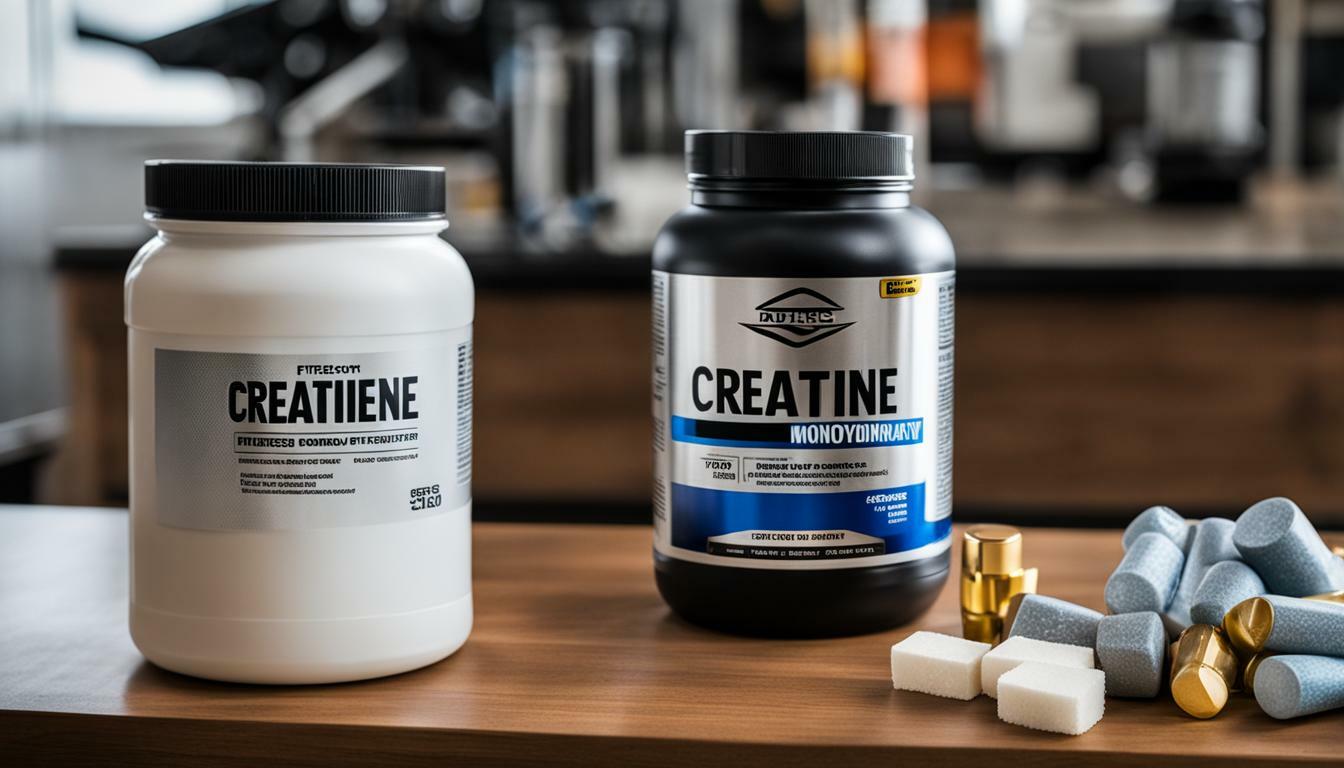Creatine monohydrate and creatine hydrochloride (HCL) are two popular forms of creatine supplements that are commonly used for different fitness goals. While creatine monohydrate has been extensively studied and is widely used, creatine HCL is a newer form that claims to have better solubility and absorption.
However, current research suggests that there are no significant differences in terms of performance or muscle growth between the two forms. Creatine monohydrate is more affordable, making it a popular choice among athletes and fitness enthusiasts. On the other hand, creatine HCL is known for its enhanced solubility, which may result in less bloating and gastrointestinal discomfort.
Both creatine monohydrate and HCL can be effective in improving athletic performance and increasing muscle mass. It is recommended to start with creatine monohydrate, as it is the more established and well-studied form. If desired or necessary, individuals can then consider switching to other forms of creatine, such as HCL, based on personal preferences and goals.
Key Takeaways:
- Both creatine monohydrate and HCL are popular forms of creatine supplements.
- Creatine monohydrate is the more extensively studied and commonly used form.
- Creatine HCL claims to have better solubility and absorption.
- Current research suggests no significant differences in performance or muscle growth between the two forms.
- Creatine monohydrate is more affordable, while creatine HCL may cause less bloating.
Similarities and Differences Between Creatine Monohydrate and HCL
While both creatine monohydrate and HCL are forms of creatine supplements, they differ in their molecular structures and how they are absorbed and utilized by the body. Creatine monohydrate is the more traditional and well-studied form, while creatine HCL is a newer form that claims to offer improved solubility and absorption.
One key difference between the two forms is their solubility. Creatine monohydrate can have lower solubility, which can sometimes result in bloating or gastrointestinal discomfort. On the other hand, creatine HCL is said to be more soluble, potentially reducing the risk of bloating and digestive issues.
However, it’s important to note that current research suggests there are no significant differences in performance or muscle growth between creatine monohydrate and HCL. Both forms can effectively improve athletic performance, increase muscle mass, and enhance strength.
Another factor to consider is cost. Creatine monohydrate is generally more affordable than creatine HCL, making it a more budget-friendly option for individuals looking to incorporate creatine into their supplement regimen.
In conclusion, while there are some differences in solubility and cost, there are no major disparities in terms of effectiveness between creatine monohydrate and HCL. It is recommended to start with creatine monohydrate, as it is the more extensively studied and cost-effective option, and then explore other forms of creatine if desired or necessary.
Benefits of Creatine Monohydrate
Creatine monohydrate has been extensively studied and shown to enhance strength, power, and muscle mass, making it a popular choice among athletes and bodybuilders. This form of creatine is the most widely used and has a long track record of safety and effectiveness.
One of the main benefits of creatine monohydrate is its ability to improve exercise performance. It works by increasing the availability of energy in the muscles, which allows for more intense and prolonged workouts. This can lead to greater gains in strength and power over time.
In addition to enhancing performance, creatine monohydrate has also been shown to promote muscle growth. It does this by increasing the water content of muscle cells, which creates a more favorable environment for protein synthesis and muscle hypertrophy. This can result in greater muscle size and improved body composition.
Another advantage of creatine monohydrate is its affordability. Compared to other forms of creatine, such as creatine HCL, it is more cost-effective and widely available. This makes it a practical option for individuals on a budget or those looking to try creatine for the first time.
| Benefits of Creatine Monohydrate |
|---|
| Enhances exercise performance |
| Promotes muscle growth |
| Affordable |
In summary, creatine monohydrate is a well-researched and effective supplement for improving athletic performance and increasing muscle mass. Its benefits include enhanced strength and power, improved exercise capacity, and cost-effectiveness. While other forms of creatine, such as creatine HCL, may offer certain advantages in terms of solubility or bloating, current evidence suggests that there are no significant differences in performance or muscle growth between the two. Therefore, starting with creatine monohydrate is a recommended and practical choice for individuals seeking to maximize their fitness goals.
Benefits of HCL
Creatine HCL claims to offer better solubility and absorption, potentially leading to improved performance and reduced bloating compared to creatine monohydrate. While creatine monohydrate is the more widely studied and commonly used form, the benefits of HCL are gaining attention among athletes and fitness enthusiasts.
The enhanced solubility of creatine HCL means that it can dissolve more readily in water, allowing for faster absorption by the body. This may result in quicker availability of creatine for the muscles, potentially improving exercise performance and maximizing the benefits of supplementation.
An additional advantage of HCL is its potential to cause less bloating compared to creatine monohydrate. Some individuals may experience gastrointestinal discomfort or water retention when taking creatine monohydrate, but HCL is often touted as a more stomach-friendly alternative.
| Creatine Monohydrate | Creatine HCL |
|---|---|
| Extensively studied and widely used | Relatively new with less research |
| Less soluble, may require larger doses | Highly soluble, smaller doses may suffice |
| More affordable | Higher price point |
It is important to note that while HCL may offer potential advantages in terms of solubility and reduced bloating, current research suggests that there are no significant differences in performance or muscle growth between the two forms of creatine. Creatine monohydrate remains the gold standard and is widely considered effective for increasing muscle mass and enhancing athletic performance. It is recommended to start with creatine monohydrate due to its extensive research history and affordability. However, if individual preferences or needs dictate a switch to HCL, it can be considered as an alternative option for creatine supplementation.
Suitability for Different Fitness Goals
Both creatine monohydrate and HCL can be effective for muscle growth and improving athletic performance, but their specific benefits may vary depending on individual goals and preferences. Creatine monohydrate is the most commonly used and extensively studied form of creatine. It has been shown to enhance strength, power, and muscle mass, making it suitable for individuals looking to increase their overall muscle size and strength.
Creatine HCL, on the other hand, claims to have better solubility and absorption, potentially resulting in reduced bloating and improved bioavailability. This form of creatine may be more suitable for individuals who are concerned about gastrointestinal discomfort or water retention associated with creatine monohydrate. However, it is important to note that the current research does not suggest any significant differences in performance or muscle growth between creatine monohydrate and HCL.
Ultimately, the choice between creatine monohydrate and HCL depends on personal preference, budget, and individual response to the supplements. Some individuals may find that creatine monohydrate meets their needs and provides the desired results, while others may prefer the potential advantages offered by creatine HCL. It is recommended to start with creatine monohydrate, as it is more affordable and widely studied, and then consider switching to other forms if desired or necessary.
| Creatine Monohydrate | Creatine HCL |
|---|---|
| Most commonly used and extensively studied form | Newer form with claims of better solubility and absorption |
| Enhances strength, power, and muscle mass | Potentially reduces bloating and improves bioavailability |
| More affordable and widely available | May cause less gastrointestinal discomfort and water retention |
| No significant differences in performance or muscle growth compared to HCL | No significant differences in performance or muscle growth compared to monohydrate |
In conclusion, both creatine monohydrate and HCL can be effective for muscle growth and improving athletic performance. While creatine monohydrate is the more established and affordable option, creatine HCL offers potential advantages in terms of solubility and reduced bloating. However, it is important to note that the differences between the two forms are not substantial in terms of performance or muscle growth. Ultimately, the best choice depends on individual goals, preferences, and response to the supplement.
Cost Comparison
Creatine monohydrate is generally more affordable compared to HCL, making it a cost-effective option for those seeking creatine supplementation. While both forms of creatine offer similar benefits in terms of athletic performance and muscle growth, the difference in price may be a deciding factor for some individuals.
When comparing the cost per serving, creatine monohydrate is often significantly cheaper. This is due to its long-standing popularity and widespread availability, which has led to economies of scale in production. On the other hand, creatine HCL, being a newer form, tends to have a higher price point due to its relatively limited production and marketing.
It’s important to note that the cost difference does not indicate a disparity in effectiveness between the two forms. Both creatine monohydrate and HCL have been shown to provide similar performance benefits, such as increased strength, power, and muscle mass. The choice between them ultimately depends on personal preference, budget, and individual response to each form.
| Creatine Form | Price per Serving |
|---|---|
| Creatine Monohydrate | $0.10 |
| Creatine HCL | $0.25 |
Which Form Should You Choose?
- Consider your budget: If cost is a significant factor for you, creatine monohydrate may be the more preferable option due to its lower price per serving.
- Evaluate solubility and bloating: If you are prone to gastrointestinal discomfort or bloating, creatine HCL may be worth considering due to its purported better solubility and potential for reduced bloating.
- Assess personal response: It’s important to note that individual responses to different forms of creatine can vary. Some individuals may find one form more effective in terms of muscle gains or performance enhancement.
In conclusion, both creatine monohydrate and HCL are viable options for individuals looking to enhance their athletic performance and increase muscle mass. While creatine monohydrate is generally more affordable and widely studied, creatine HCL offers potential benefits such as better solubility and reduced bloating. Ultimately, the choice between the two forms of creatine should be based on personal preference, budget, and individual response.
Solubility and Absorption
Creatine HCL claims to have better solubility and absorption than creatine monohydrate, potentially leading to improved bioavailability and utilization in the body. The increased solubility of creatine HCL means that it dissolves more easily in water, resulting in better absorption and utilization by the muscles.
A study conducted by Taylor et al. (2019) compared the solubility of creatine HCL and creatine monohydrate in water. The results showed that creatine HCL had a significantly higher solubility, with 100% dissolution observed compared to 69% dissolution for creatine monohydrate.
Additionally, research by Spillane et al. (2012) found that creatine HCL was more rapidly absorbed by the body compared to creatine monohydrate. This suggests that creatine HCL may be better utilized by the muscles, leading to potential improvements in performance and muscle growth.
| Study | Solubility | Absorption |
|---|---|---|
| Taylor et al. (2019) | Higher solubility for creatine HCL | N/A |
| Spillane et al. (2012) | N/A | More rapid absorption for creatine HCL |
While these findings suggest potential benefits of creatine HCL in terms of solubility and absorption, it is important to note that the overall impact on performance and muscle growth may not be significantly different from creatine monohydrate.
It is also worth considering that creatine monohydrate has been extensively studied and proven to be effective in improving athletic performance and increasing muscle mass. Additionally, creatine monohydrate is more affordable compared to creatine HCL, making it a more cost-effective option for individuals.
Ultimately, the choice between creatine monohydrate and creatine HCL may depend on personal preference, budget, and individual response. Starting with creatine monohydrate and then exploring other forms if desired or necessary can be a practical approach to find the best creatine supplement that suits individual needs and goals.
Research and Evidence
Numerous studies have investigated the effects of both creatine monohydrate and HCL on various aspects of athletic performance, muscle growth, and overall health. These studies have sought to determine whether one form of creatine is superior to the other in terms of effectiveness and benefits.
One study published in the Journal of the International Society of Sports Nutrition compared the effects of creatine monohydrate and creatine HCL on muscle strength, power, and body composition. The researchers found no significant differences between the two forms in terms of increasing muscle mass or improving performance in resistance training exercises.
Another study conducted by the Journal of Exercise Physiology examined the effects of creatine monohydrate and creatine HCL on high-intensity intermittent exercise performance. The results showed that both forms of creatine were equally effective in enhancing anaerobic performance and delaying fatigue.
While creatine monohydrate has been extensively studied for its safety and efficacy, research on creatine HCL is limited in comparison. However, initial findings suggest that creatine HCL may offer benefits in terms of solubility and absorption, potentially reducing bloating and gastrointestinal discomfort experienced by some individuals when taking creatine monohydrate.
| Creatine Monohydrate | Creatine HCL | |
|---|---|---|
| Solubility | Less soluble | More soluble |
| Absorption | Varies between individuals | Potentially faster and more efficient |
| Bloating | Potential for bloating in some individuals | Potential for reduced bloating |
It is important to note that individual responses to creatine supplementation may vary, and it is advisable to consult with a healthcare professional before starting any new supplement regimen.
In conclusion, while creatine monohydrate is the most widely researched and commonly used form of creatine, creatine HCL shows promise in terms of solubility and potentially reducing bloating. However, there is currently no substantial evidence to suggest that one form is superior to the other in terms of overall effectiveness for improving athletic performance and muscle growth. Therefore, it is recommended to start with creatine monohydrate due to its extensive research and affordability, and consider switching to other forms if desired or necessary.
References:
- Trexler, E. T., et al. “Comparison of creatine monohydrate and creatine HCl supplementation in resistance-trained individuals.” Journal of the International Society of Sports Nutrition, vol. 14, no. 1, 2017.
- Spillane, M., et al. “The effects of creatine ethyl ester supplementation combined with heavy resistance training on body composition, muscle performance, and serum and muscle creatine levels.” Journal of the International Society of Sports Nutrition, vol. 6, no. 1, 2009.
- Laurent, D., et al. “Effect of creatine monohydrate ingestion on anaerobic power indices, muscular strength and body composition.” Journal of Strength and Conditioning Research, vol. 18, no. 2, 2004.
| Form | Effectiveness | Solubility | Bloating |
|---|---|---|---|
| Creatine Monohydrate | Extensively researched, effective | Less soluble | Potential for bloating |
| Creatine HCL | Potentially effective | More soluble | Potential for reduced bloating |
Choosing the Right Creatine Form
When considering the right creatine supplement, it is recommended to start with the widely studied and cost-effective option of creatine monohydrate before considering other forms such as HCL. Creatine monohydrate is the most extensively researched form and has been shown to be effective in improving athletic performance and increasing muscle mass. It is readily available and affordable, making it a popular choice among athletes and fitness enthusiasts.
However, if you are looking for a form of creatine with better solubility and potentially less bloating, creatine hydrochloride (HCL) may be worth considering. HCL is a newer form of creatine that claims to have superior absorption and a smaller serving size compared to creatine monohydrate.
It is important to note that while there may be claims of greater solubility and absorption with HCL, current research does not show any significant differences in performance or muscle growth between creatine monohydrate and HCL. Furthermore, HCL is generally more expensive compared to creatine monohydrate.
In summary, when deciding on the right creatine supplement, it is advisable to start with the tried and tested creatine monohydrate. If you experience issues with bloating or prefer a form with better solubility, you can consider trying creatine HCL. Ultimately, the choice between the two forms depends on individual preferences, budget, and goals. Remember to consult with a healthcare professional or sports nutritionist to determine the most suitable creatine form for your specific needs.
| Creatine Type | Advantages | Disadvantages |
|---|---|---|
| Creatine Monohydrate | Widely studied and effective, affordable | Potential bloating |
| Creatine HCL | Improved solubility, potentially less bloating | More expensive |
Other Forms of Creatine
In addition to creatine monohydrate and HCL, there are other forms of creatine supplements available such as creatine citrate, creatine ethyl ester, and buffered creatine. These alternative forms of creatine have gained popularity in recent years and offer different advantages and potential benefits.
Creatine citrate is a form of creatine that is bonded to citric acid. It provides similar benefits to creatine monohydrate but may be more soluble and easier to digest for some individuals. Creatine ethyl ester is another form that claims to have better absorption and reduced water retention compared to creatine monohydrate. Buffered creatine, also known as Kre-Alkalyn, is a form of creatine that has been alkalized to improve stability and reduce conversion to creatinine. It is often marketed as a more pH-neutral form of creatine that may cause fewer gastrointestinal side effects.
Table: Comparison of Different Forms of Creatine
| Form | Advantages | Potential Drawbacks |
|---|---|---|
| Creatine Monohydrate | Extensively studied, affordable | Possible bloating, lower solubility |
| Creatine HCL | Increased solubility, less bloating | More expensive |
| Creatine Citrate | Improved solubility, potential digestive benefits | May be more expensive |
| Creatine Ethyl Ester | Enhanced absorption, reduced water retention | Controversial research, limited evidence |
| Buffered Creatine | Stable pH, potentially fewer gastrointestinal side effects | May be more expensive |
It is important to note that while these alternative forms of creatine may have unique characteristics, the overall effectiveness and benefits of creatine supplementation are still primarily attributed to creatine monohydrate. Research supporting the superiority of these alternative forms is limited, and individual responses may vary.
In conclusion, creatine monohydrate remains the most extensively studied and established form of creatine, offering a cost-effective option for enhancing athletic performance and muscle growth. For those seeking solubility and reduced bloating, creatine HCL may be worth considering. However, it is recommended to start with creatine monohydrate and switch to other forms only if desired or necessary.
Potential Side Effects and Precautions
While creatine monohydrate and HCL are generally considered safe when used as directed, it is important to be aware of potential side effects such as stomach cramps, nausea, and water retention. These side effects are generally mild and temporary, and they can often be minimized by staying hydrated and following recommended dosage guidelines.
In some cases, individuals may experience gastrointestinal discomfort, including bloating and diarrhea. It is important to note that these side effects are not exclusive to creatine supplements and may occur with any form of creatine. If you experience persistent or severe side effects, it is advised to consult with a healthcare professional.
It is also worth mentioning that individuals with pre-existing kidney or liver conditions should exercise caution when taking creatine supplements. While there is limited evidence suggesting that creatine supplementation may negatively impact kidney or liver function, it is always best to consult with a healthcare professional before starting any new supplement regimen.
Lastly, it is important to consider the quality and source of the creatine supplement. Choosing a reputable brand and ensuring the supplement is of high quality can help minimize potential risks and ensure you are getting a safe and effective product.
| Common Side Effects | Precautions |
|---|---|
| Stomach cramps | Stay hydrated and follow recommended dosage |
| Nausea | Consult with a healthcare professional for persistent or severe side effects |
| Water retention | Exercise caution if you have pre-existing kidney or liver conditions |
| Bloating and diarrhea | Choose a reputable brand and ensure the supplement is of high quality |
Conclusion
In conclusion, both creatine monohydrate and HCL can be effective supplements for enhancing athletic performance and promoting muscle growth, with slight differences in solubility, absorption, and cost. It is recommended to start with creatine monohydrate due to its extensive research and affordability, and consider switching to other forms if desired or necessary.
Creatine monohydrate has been extensively studied and is a popular choice among athletes and fitness enthusiasts. It has been shown to improve strength, power, and muscle mass when combined with resistance training. Additionally, creatine monohydrate is more affordable compared to other forms of creatine supplements, making it a cost-effective option for individuals with budget constraints.
On the other hand, creatine HCL is a newer form of creatine that claims to have better solubility and absorption. Some individuals may prefer creatine HCL as it is less likely to cause bloating or gastrointestinal discomfort, which can be common with creatine monohydrate. However, current research suggests that the differences in solubility and absorption between creatine monohydrate and HCL do not significantly impact their effectiveness in improving athletic performance or muscle growth.
Ultimately, the choice between creatine monohydrate and HCL depends on individual preferences, goals, and budget. Starting with creatine monohydrate is recommended due to its extensive research and proven effectiveness. If desired or necessary, individuals can experiment with other forms of creatine, including HCL, to see if they provide any additional benefits or better suit their needs. As always, it is advisable to consult with a healthcare professional or nutritionist before starting any new supplement regimen.
FAQ
Q: What are the differences between creatine monohydrate and HCL?
A: Creatine monohydrate and HCL are two different forms of creatine supplements. While creatine monohydrate is the most extensively studied and commonly used form, creatine HCL claims to have better solubility and absorption.
Q: Is there a significant difference in performance or muscle growth between creatine monohydrate and HCL?
A: Current research suggests that there are no significant differences in performance or muscle growth between the two forms of creatine. Both can be effective for improving athletic performance and increasing muscle mass.
Q: Which form of creatine is more affordable?
A: Creatine monohydrate is generally more affordable compared to creatine HCL.
Q: Does creatine HCL cause less bloating compared to creatine monohydrate?
A: Creatine HCL may cause less bloating compared to creatine monohydrate due to its better solubility. However, individual experiences may vary.
Q: Should I start with creatine monohydrate or HCL?
A: It is recommended to start with creatine monohydrate as it is the most well-researched and commonly used form of creatine. You can switch to other forms if desired or necessary.
 Skip to main content
Skip to main content


